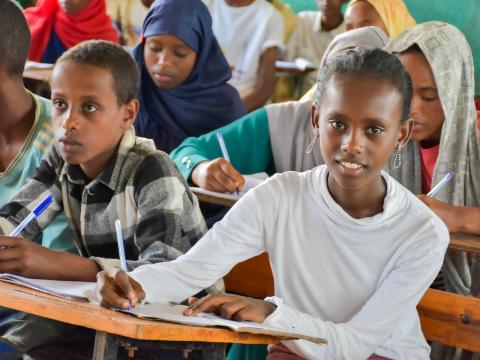Shaping a Better Tomorrow: The Impact of Quality Learning Environments

Imagine a classroom so overcrowded and uncomfortable that learning becomes a daily struggle. For many children around the world, this is the harsh reality they face every day. Without proper infrastructure, students were forced to endure cramped classrooms, stifling heat, and constant distractions, conditions that hindered their ability to learn and grow.
Thirteen-year-old Deborah, who aspires to be an accountant one day and is a former sponsored child of World Vision Ethiopia, was once one of those students who struggled to concentrate in her classes. “Being in such a classroom was not inviting—it was unbearably hot, even on cold days, let alone during the scorching heat of the sun,” Deborah recalls. “The suffocating conditions made it so difficult to focus that I often found myself falling asleep in class.”
These improvements are part of World Vision’s broader commitment to enhancing education in the Omonada District. For instance, the construction of four new classroom blocks at one primary school has significantly improved learning conditions. Each classroom now accommodates only 40 students, with just three students per desk, an upgrade from the previous overcrowded setup of four per desk. As a result, more than 960 students now benefit directly from a more spacious and comfortable learning environment at this school, both during the morning and afternoon shifts. Overall, World Vision has strengthened educational access and quality across several schools in the district, supporting a total of 2,557 sponsored children who are currently enrolled in school.
“In the new classrooms, I can focus, interact with my teacher, and feel confident about my future,” Deborah says, her voice brimming with gratitude. “Thanks to World Vision, I know I will achieve my dream of becoming an accountant and working with one of Ethiopia’s leading banks.”
World Vision’s support doesn’t stop there. It also provides essential services such as WASH (Water, Sanitation, and Hygiene), Menstrual Hygiene Management (MHM), and school supplies to both sponsored and non-sponsored children.
In the Omonada District, World Vision Ethiopia has implemented a variety of project models, including Learning Roots (LR) for Early Childhood Development (ECD) targeting children aged 3–6 years, Unlock Literacy for children aged 7–9 years, and the Basic Education Programme for children aged 7–14 years. These initiatives are all designed to ensure that every child in the district has access to the education and resources they need to succeed. Currently, over 78,000 students, ranging from ECD to high school, are attending school in the district, and World Vision’s contributions have made a significant impact.
By Fitalew Bahiru, Communications Specialist, World Vision Ethiopia